2013 has proved to be a big one for us at Ushahidi. Coming from a 2012 where a lot was done, but where we all felt we weren't shipping enough product, the acceleration has proved to be refreshing. At this year's meeting we made a commitment to organize better towards this, and the fruits have borne out.
TL;DR - We shipped Crowdmap, Ushahidi v3, SwiftRiver and BRCK in 2013 (+ Ping too now)
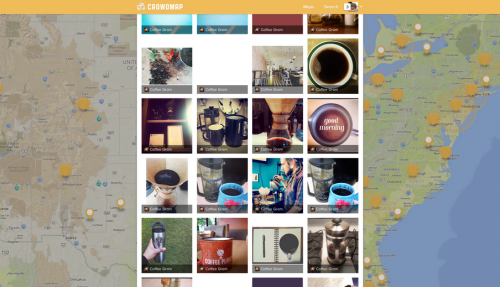 The New Crowdmap launched earlier this year[/caption]
Over a year ago, the Crowdmap team dared to dream of an extreme pivot for the platform. I wrote about it, and about our decision to go with it, since we felt that some of us might have paradigm-blinders on, and a shakeup was in order. New Crowdmap shipped in April (thanks to the efforts of Brian, Evan and Brandon). It's a completely different platform, where the shift was for personal ownership of ones data, with less focus on strict location and "map owners" than had been seen in the past.
It's taken all of us a while to realize just how powerful this new API-based platform is. Recently, David dived in and created a base mobile platform for a community "fix it" app (both iOS and Android) that will be up on Github shortly. It uses the powerful hooks in Crowdmap to power a mobile experience that any neighborhood or community can customize for their own uses.
[caption id="attachment_14229" align="alignnone" width="500"]
The New Crowdmap launched earlier this year[/caption]
Over a year ago, the Crowdmap team dared to dream of an extreme pivot for the platform. I wrote about it, and about our decision to go with it, since we felt that some of us might have paradigm-blinders on, and a shakeup was in order. New Crowdmap shipped in April (thanks to the efforts of Brian, Evan and Brandon). It's a completely different platform, where the shift was for personal ownership of ones data, with less focus on strict location and "map owners" than had been seen in the past.
It's taken all of us a while to realize just how powerful this new API-based platform is. Recently, David dived in and created a base mobile platform for a community "fix it" app (both iOS and Android) that will be up on Github shortly. It uses the powerful hooks in Crowdmap to power a mobile experience that any neighborhood or community can customize for their own uses.
[caption id="attachment_14229" align="alignnone" width="500"]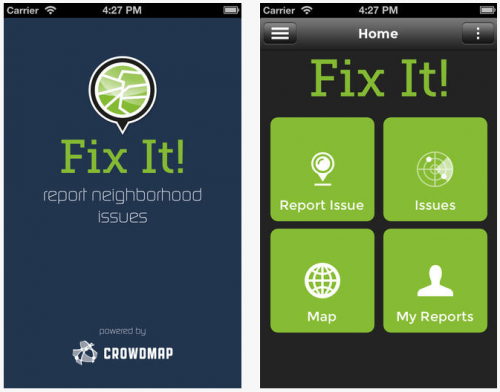 Fix It: an app built on top of the Crowdmap API[/caption]
We're now playing with other ideas around Crowdmap, which range from geo-grouping Instagram hash-tagged photos to using Crowdmap as a base platform as a thin-layer client within Facebook for a larger audience of crisis mappers. We're just scratching the surface of what is possible.
Fix It: an app built on top of the Crowdmap API[/caption]
We're now playing with other ideas around Crowdmap, which range from geo-grouping Instagram hash-tagged photos to using Crowdmap as a base platform as a thin-layer client within Facebook for a larger audience of crisis mappers. We're just scratching the surface of what is possible.
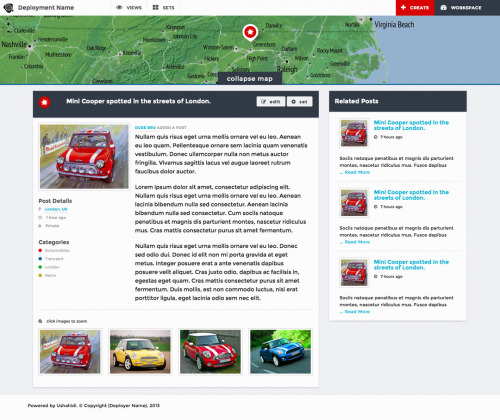 A mockup of Ushahidi v3, dev release due Oct 2013[/caption]
Over a year ago we embarked upon a plan to rebuild our core Ushahidi platform from the ground up. This project is called "v3" internally, and it's complete rewrite of the codebase, getting us away from the legacy code, architecture and framework that we started with in 2008. We entered into this with a great deal of focus on users, the people who deploy the software, as well as the software engineers who contribute to the codebase.
Ushahidi v3 is in alpha right now, with a planned October (this month) developer release to the greater community. When I look back on the contribution to the platform of so many people, when I think of the thousands of deployments and of the millions who are helped due to its existence, I find that I can't wait until they're on this newer version. It will make a difference.
A mockup of Ushahidi v3, dev release due Oct 2013[/caption]
Over a year ago we embarked upon a plan to rebuild our core Ushahidi platform from the ground up. This project is called "v3" internally, and it's complete rewrite of the codebase, getting us away from the legacy code, architecture and framework that we started with in 2008. We entered into this with a great deal of focus on users, the people who deploy the software, as well as the software engineers who contribute to the codebase.
Ushahidi v3 is in alpha right now, with a planned October (this month) developer release to the greater community. When I look back on the contribution to the platform of so many people, when I think of the thousands of deployments and of the millions who are helped due to its existence, I find that I can't wait until they're on this newer version. It will make a difference.
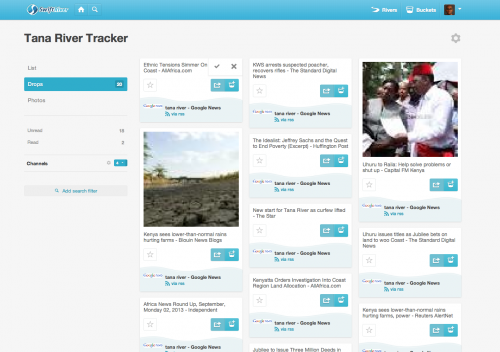 SwiftRiver shipped in June and was successfully deployed in Washington State[/caption]
The SwiftRiver platform has morphed through many ideas, builds since 2009 and finally reached the stage where it is a real product in June of this year. The hard work of Emmanuel, Brian and Brandon got us to a place where we have an incredible platform for channeling large amounts of data. We worked closely with a deploying organization to get it to the state that its in now.
We find ourselves at a strange place though. We feel as though we have a great product, that is finally shipped, but lack the resources to keep it going in-house. With this in mind, we decided in June to change our position on SwiftRiver.
We'll still hold the repository for the platform, but we cannot afford to commit any more people to build, extend and manage it ourselves. Our goal of building the tool are met, and we'll still use it ourselves internally and for external projects that we are a part of, however for it to truly grow and expand it'll need a lot more love and attention from the dev community.
SwiftRiver shipped in June and was successfully deployed in Washington State[/caption]
The SwiftRiver platform has morphed through many ideas, builds since 2009 and finally reached the stage where it is a real product in June of this year. The hard work of Emmanuel, Brian and Brandon got us to a place where we have an incredible platform for channeling large amounts of data. We worked closely with a deploying organization to get it to the state that its in now.
We find ourselves at a strange place though. We feel as though we have a great product, that is finally shipped, but lack the resources to keep it going in-house. With this in mind, we decided in June to change our position on SwiftRiver.
We'll still hold the repository for the platform, but we cannot afford to commit any more people to build, extend and manage it ourselves. Our goal of building the tool are met, and we'll still use it ourselves internally and for external projects that we are a part of, however for it to truly grow and expand it'll need a lot more love and attention from the dev community.
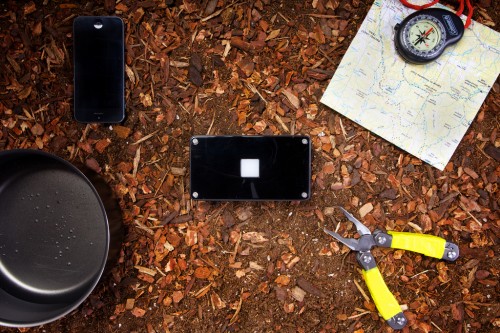 The first production run of the BRCK ships Nov 2013[/caption]
2012 found us acting like a bunch of tinkering mad engineers playing with this idea of a simple connectivity device, designed for those of us who live in places like Africa. In January of this year we got to a place where we had a prototype that worked and which we thought might interest others. In April we launched the BRCK Kickstarter, which went incredibly well, and convinced us there was enough demand for a device like this.
The first units ship in November. Meanwhile we are raising capital to spin the BRCK out as a commercial entity so that it can grow to its full potential.
The first production run of the BRCK ships Nov 2013[/caption]
2012 found us acting like a bunch of tinkering mad engineers playing with this idea of a simple connectivity device, designed for those of us who live in places like Africa. In January of this year we got to a place where we had a prototype that worked and which we thought might interest others. In April we launched the BRCK Kickstarter, which went incredibly well, and convinced us there was enough demand for a device like this.
The first units ship in November. Meanwhile we are raising capital to spin the BRCK out as a commercial entity so that it can grow to its full potential.
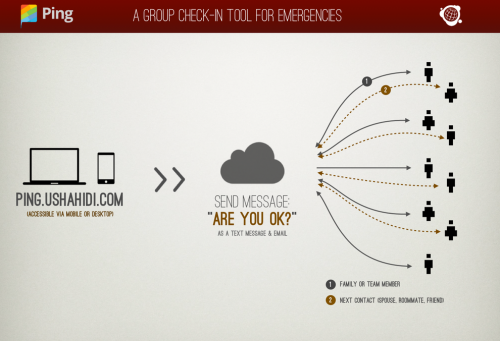 The Ping App - a group check-in tool for emergencies[/caption]
Last week we quickly threw together a new free and open source tool called Ping (Github code). It's a tool for group checkins during an emergency using SMS and secondary channels like email, Twitter DMs, Whatsapp and IVR. It's shipped as well, already out there for you to use, though it's very raw and needs a lot of love.
The Ping App - a group check-in tool for emergencies[/caption]
Last week we quickly threw together a new free and open source tool called Ping (Github code). It's a tool for group checkins during an emergency using SMS and secondary channels like email, Twitter DMs, Whatsapp and IVR. It's shipped as well, already out there for you to use, though it's very raw and needs a lot of love.
Crowdmap
[caption id="attachment_14228" align="alignnone" width="500"] The New Crowdmap launched earlier this year[/caption]
Over a year ago, the Crowdmap team dared to dream of an extreme pivot for the platform. I wrote about it, and about our decision to go with it, since we felt that some of us might have paradigm-blinders on, and a shakeup was in order. New Crowdmap shipped in April (thanks to the efforts of Brian, Evan and Brandon). It's a completely different platform, where the shift was for personal ownership of ones data, with less focus on strict location and "map owners" than had been seen in the past.
It's taken all of us a while to realize just how powerful this new API-based platform is. Recently, David dived in and created a base mobile platform for a community "fix it" app (both iOS and Android) that will be up on Github shortly. It uses the powerful hooks in Crowdmap to power a mobile experience that any neighborhood or community can customize for their own uses.
[caption id="attachment_14229" align="alignnone" width="500"]
The New Crowdmap launched earlier this year[/caption]
Over a year ago, the Crowdmap team dared to dream of an extreme pivot for the platform. I wrote about it, and about our decision to go with it, since we felt that some of us might have paradigm-blinders on, and a shakeup was in order. New Crowdmap shipped in April (thanks to the efforts of Brian, Evan and Brandon). It's a completely different platform, where the shift was for personal ownership of ones data, with less focus on strict location and "map owners" than had been seen in the past.
It's taken all of us a while to realize just how powerful this new API-based platform is. Recently, David dived in and created a base mobile platform for a community "fix it" app (both iOS and Android) that will be up on Github shortly. It uses the powerful hooks in Crowdmap to power a mobile experience that any neighborhood or community can customize for their own uses.
[caption id="attachment_14229" align="alignnone" width="500"] Fix It: an app built on top of the Crowdmap API[/caption]
We're now playing with other ideas around Crowdmap, which range from geo-grouping Instagram hash-tagged photos to using Crowdmap as a base platform as a thin-layer client within Facebook for a larger audience of crisis mappers. We're just scratching the surface of what is possible.
Fix It: an app built on top of the Crowdmap API[/caption]
We're now playing with other ideas around Crowdmap, which range from geo-grouping Instagram hash-tagged photos to using Crowdmap as a base platform as a thin-layer client within Facebook for a larger audience of crisis mappers. We're just scratching the surface of what is possible.
Ushahidi Platform (v3)
[caption id="attachment_14227" align="alignnone" width="500"] A mockup of Ushahidi v3, dev release due Oct 2013[/caption]
Over a year ago we embarked upon a plan to rebuild our core Ushahidi platform from the ground up. This project is called "v3" internally, and it's complete rewrite of the codebase, getting us away from the legacy code, architecture and framework that we started with in 2008. We entered into this with a great deal of focus on users, the people who deploy the software, as well as the software engineers who contribute to the codebase.
Ushahidi v3 is in alpha right now, with a planned October (this month) developer release to the greater community. When I look back on the contribution to the platform of so many people, when I think of the thousands of deployments and of the millions who are helped due to its existence, I find that I can't wait until they're on this newer version. It will make a difference.
A mockup of Ushahidi v3, dev release due Oct 2013[/caption]
Over a year ago we embarked upon a plan to rebuild our core Ushahidi platform from the ground up. This project is called "v3" internally, and it's complete rewrite of the codebase, getting us away from the legacy code, architecture and framework that we started with in 2008. We entered into this with a great deal of focus on users, the people who deploy the software, as well as the software engineers who contribute to the codebase.
Ushahidi v3 is in alpha right now, with a planned October (this month) developer release to the greater community. When I look back on the contribution to the platform of so many people, when I think of the thousands of deployments and of the millions who are helped due to its existence, I find that I can't wait until they're on this newer version. It will make a difference.
SwiftRiver
[caption id="attachment_14225" align="alignnone" width="500"] SwiftRiver shipped in June and was successfully deployed in Washington State[/caption]
The SwiftRiver platform has morphed through many ideas, builds since 2009 and finally reached the stage where it is a real product in June of this year. The hard work of Emmanuel, Brian and Brandon got us to a place where we have an incredible platform for channeling large amounts of data. We worked closely with a deploying organization to get it to the state that its in now.
We find ourselves at a strange place though. We feel as though we have a great product, that is finally shipped, but lack the resources to keep it going in-house. With this in mind, we decided in June to change our position on SwiftRiver.
We'll still hold the repository for the platform, but we cannot afford to commit any more people to build, extend and manage it ourselves. Our goal of building the tool are met, and we'll still use it ourselves internally and for external projects that we are a part of, however for it to truly grow and expand it'll need a lot more love and attention from the dev community.
SwiftRiver shipped in June and was successfully deployed in Washington State[/caption]
The SwiftRiver platform has morphed through many ideas, builds since 2009 and finally reached the stage where it is a real product in June of this year. The hard work of Emmanuel, Brian and Brandon got us to a place where we have an incredible platform for channeling large amounts of data. We worked closely with a deploying organization to get it to the state that its in now.
We find ourselves at a strange place though. We feel as though we have a great product, that is finally shipped, but lack the resources to keep it going in-house. With this in mind, we decided in June to change our position on SwiftRiver.
We'll still hold the repository for the platform, but we cannot afford to commit any more people to build, extend and manage it ourselves. Our goal of building the tool are met, and we'll still use it ourselves internally and for external projects that we are a part of, however for it to truly grow and expand it'll need a lot more love and attention from the dev community.
BRCK
[caption id="attachment_14224" align="alignnone" width="500"] The first production run of the BRCK ships Nov 2013[/caption]
2012 found us acting like a bunch of tinkering mad engineers playing with this idea of a simple connectivity device, designed for those of us who live in places like Africa. In January of this year we got to a place where we had a prototype that worked and which we thought might interest others. In April we launched the BRCK Kickstarter, which went incredibly well, and convinced us there was enough demand for a device like this.
The first units ship in November. Meanwhile we are raising capital to spin the BRCK out as a commercial entity so that it can grow to its full potential.
The first production run of the BRCK ships Nov 2013[/caption]
2012 found us acting like a bunch of tinkering mad engineers playing with this idea of a simple connectivity device, designed for those of us who live in places like Africa. In January of this year we got to a place where we had a prototype that worked and which we thought might interest others. In April we launched the BRCK Kickstarter, which went incredibly well, and convinced us there was enough demand for a device like this.
The first units ship in November. Meanwhile we are raising capital to spin the BRCK out as a commercial entity so that it can grow to its full potential.
Bonus: Ping App
[caption id="attachment_14186" align="alignnone" width="500"] The Ping App - a group check-in tool for emergencies[/caption]
Last week we quickly threw together a new free and open source tool called Ping (Github code). It's a tool for group checkins during an emergency using SMS and secondary channels like email, Twitter DMs, Whatsapp and IVR. It's shipped as well, already out there for you to use, though it's very raw and needs a lot of love.
The Ping App - a group check-in tool for emergencies[/caption]
Last week we quickly threw together a new free and open source tool called Ping (Github code). It's a tool for group checkins during an emergency using SMS and secondary channels like email, Twitter DMs, Whatsapp and IVR. It's shipped as well, already out there for you to use, though it's very raw and needs a lot of love.